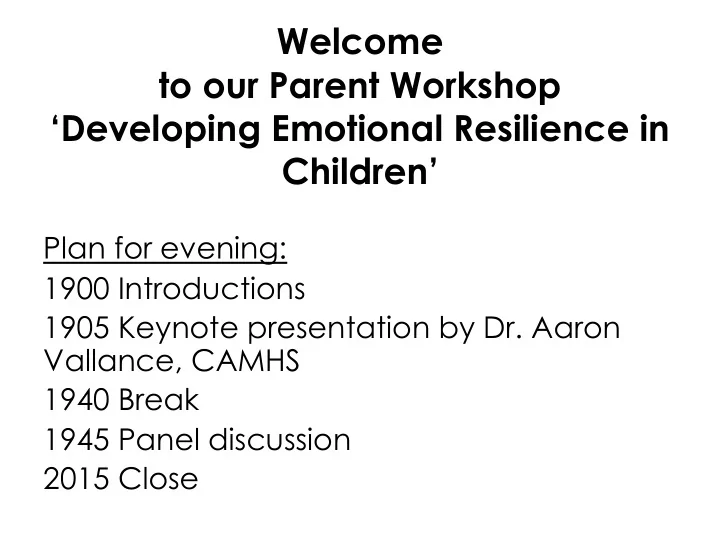

Welcome to our Parent Workshop ‘Developing Emotional Resilience in Children’ Plan for evening: 1900 Introductions 1905 Keynote presentation by Dr. Aaron Vallance, CAMHS 1940 Break 1945 Panel discussion 2015 Close
Managing Anger Dr. Aaron Vallance Consultant in Child & Adolescent Psychiatry, Surrey And Borders Partnership NHS Trust Hon. Clinical Senior Lecturer, Imperial College London Dad to Joe (ex-St Michaels) and Ben (4H)
What gets YOU Angry?
Anger is… • Normal • Common • Dependent on context/meaning of a situation. • May relate to other things going on.
Emotional Anger / frustration Physiological Cognitive Muscle tension “ How dare you Restless do/say that!” Heart races “ It’s all ruined!” Nausea / butterflies “ So unfair!” Clammy “ This is a big deal!” Difficulty breathing Behavioural Shout / argue Say something you don’t mean Leave Slam / Throw Hit out
4 / 10 anger thermomete r
8 / 10
10 / 10
Angry mind Wise mind
Step 1: Acknowledge the feelings Hmm..
Step 1: Acknowledge the feelings Hmm.. I can see you’re angry,
Step 1: Acknowledge the feelings Hmm.. I can see you’re angry, X must be really annoying you.
Step 1: Acknowledge the feelings • Active listening – calmly • Name the feeling - descriptively • Connect with them, showing you understand why they’re angry – non-judgementally / slowly • But if temperature is too hot, now’s not the time to get drawn into the detail.
Step 1 (if it’s you who’s angry): Acknowledge it!
Step 2 (if things are too hot): Time Out Somewhere: - To be alone - That’s calm & quiet - Distractions are okay
10 / 10 anger thermomete r
8 / 10
4 / 10
Step 3: Strategies to reduce anger
Step 3: Strategies to reduce anger Breathing Exercises Visualization - slow deep breaths, counting.. - may incorporate breathing exercise e.g. balloon, waves Muscle Tension & Relaxation Mindfulness - work from head to - bringing attention to the toe, tensing muscles present. then release - acknowledging any worries, but gently move on to the senses. - guided mindfulness activities (e.g. Headspace app). Distraction
Mindfulness exercise: “The Visitor”
Step 4: Managing angry thoughts
Step 4: Managing angry thoughts • People may have similar thoughts popping up each time they’re angry, linked to wider tendencies in their patterns of thinking: – Taking things too personally. – Overly focussing on the negative, ignoring the positive. – Expecting too much from themselves or others. – Black-and-white thinking.
Step 4: Managing angry thoughts • Try to challenge negative thoughts with something more balanced. E.g. – “That email appeared hostile, but did they really mean it as such.” [not take things too personally] – “The passenger spent ages talking to the driver, but maybe they had a good reason. And so what if we’re late anyway.” [don’t expect too much from others / so what anyway] – “My child ignored my instruction, but only because they were too busy clearing the table.”[ignoring the positive]
Step 4: Managing angry thoughts • Problem-solving – listing solutions – pros & cons – who can help? • Anger related to defiant behaviour – It’s only once anger has subsided , that would be best time to discuss the rule/instruction, and ensure it’s carried out.
Step 4: Managing angry thoughts What’s underneath the anger?..
Managing anger when being bullied • Bullying can be: – physical, verbal, or isolating. – in person or online. • Very understandable to be angry! • Tell parents and staff, so they can intervene. • When it occurs, best if child: – Ignores/walks off. – If confident, responds unfazed…
https://www.youtube.com/watch?v=7 oKjW1OIjuw
Quality time is important!
And so are the basics!..
Summary Acknowledge the feelings
Be kind to yourself too: no-one’s perfect!
Thank you!
BREAK (5 mins) Please take a moment to write an anonymous question for the panel.
PANEL DISCUSSION - Dr. Aaron Vallance, Consultant in Child and Adolescent Psychiatry, CAMHS - Dr. Claire Whitefield, Consultant Child and Adolescent Psychotherapist, CAMHS - James Bawn, Deputy Headteacher
Recommend
More recommend